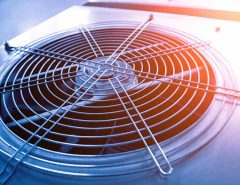To understand what type of heating system is the best, here is a small list of those that are present in the modern market with pros and cons.
What Is The Best Type of Heating System?
Here is a shortlist of the heating system options that might be of interest to you:
1. Heat pump
It helps to use the free thermal energy of water, soil, sun or air, turning them into useful heat for heating the room. In the summer, the system can work in the reverse order, i.e. cool the air and provide a pleasant microclimate.
Pros:
- Comfort;
- Low operating costs;
- Long service life.
Cons:
- Initial investment;
- Dependence on electricity.
They are able to reuse the heat that leaves the room, benefiting from heat loss. It is better to consider finding a contractor for installation.
2. Solid fuel boiler
It is an equipment made of cast iron or steel with a combustion chamber. The device operates on coal, briquettes, pellets or wood, providing heat to large areas. Double-circuit devices can also be used for hot water supply at home.
Pros:
- Use of renewable resources (firewood, pellets);
- Low operating costs.
Cons:
- It is necessary to constantly maintain and clean the device, monitor the quality of firewood;
- It is necessary to constantly monitor that there is fuel in the boiler (in the absence of a buffer tank or a large tank for pallets);
- The need for a separate boiler room and storage space for firewood.
Solid fuel boilers quickly pay back their cost, can work without electricity and are used completely autonomously. Finding a contractor will give confidence in the results.
3. Gas boilers
Gas boilers only for heating called single-circuit. Bypass models are also able to provide the house with hot water. Gas boilers are very easy to operate and heating up even large rooms, they give off heat perfectly.
Pros:
- Comfort;
- Long service life.
Cons:
- Dependence on gas and its quality;
- Most household gas boilers require a coaxial chimney.
4. Electric boilers
This type of heating system is able to work autonomously, maintaining the desired microclimate in automatic mode. They are compact, productive and completely safe. Although, one has to consider finding a contractor to ensure that everything will be fine in the further operation of the device.
Pros:
- Comfort – the boiler will independently maintain the set temperature and does not need special maintenance.
- Easy to install – no special ventilation, chimney or separate room is needed.
- The device takes up little space, and to get started, you just need to connect it to the power supply.
Cons:
- Dependence on electricity. No power, no heat;
- A large load on the power grid. You will have to take care of high-quality wiring, think of finding a contractor.
5. Ceramic panels
They are able to heat the house or office themselves, or used as an additional source of heat. It is quite problematic to install this device by a person himself due to the immense mass of the appliance, consider finding a contractor.
Pros:
- Easy to operate;
- Energy saving in comparison with other household appliances. The efficiency of ceramic panels is the highest compared to other heating options.
- It does not dry air, because the heating element does not directly come in contact with oxygen. It might be the most efficient heating system.
Cons:
- Often a fragile and heavy structure, which is better to immediately mount on the wall and not move around the house.
- Large dimensions, when compared with similar models of other household appliances in terms of heating power.
6. Electric convectors
They are mobile, extremely understandable in operation and inexpensive, therefore they have earned wide distribution. Think of finding a contractor to achieve the best results.
Pros:
- The price of electric convectors is the most affordable compared to other heating devices.
- Easy to operate. It is enough to turn on the heater in the outlet – and it already works.
- Quick room heating. For half an hour, the heater will bring the room temperature to a comfortable rate.
- Devices are protected from dripping on the heating element, which allows you to mount convectors even in bathrooms. Many models are also protected from tipping over.
- Convectors with a motion sensor will automatically turn off if no one is in the room.
Cons:
- Big power usage;
- Dry the air.
7. Infrared heaters
The thermal energy that the device gives is similar to the rays of the sun – it immediately warms objects, which then give their heat to the air.
Pros:
- Heats objects, not air (effective when it is impossible to heat the room with air heating).
- Does not dry out the air;
- Quickly warm the room to the desired temperature;
- Easy to install and very mobile;
Cons:
- Big power usage.
IR heaters are diverse in size and installation methods, so for each specific case, it is easy to choose the most efficient model. Think of finding a contractor to make the best choice.




